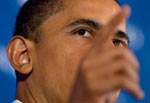 Washington Post – Editorial: President Obama is making the case that his Iran strategy is starting to deliver significant returns. In some important ways, he is right. The president said on taking office that if Iranian leaders refused negotiations on their nuclear program, he would seek to raise the pressure on them through multilateral sanctions.
Washington Post – Editorial: President Obama is making the case that his Iran strategy is starting to deliver significant returns. In some important ways, he is right. The president said on taking office that if Iranian leaders refused negotiations on their nuclear program, he would seek to raise the pressure on them through multilateral sanctions.
The Washington Post
Editorial
Thursday, August 5, 2010; A16
 PRESIDENT OBAMA is making the case that his Iran strategy is starting to deliver significant returns. In some important ways, he is right. The president said on taking office that if Iranian leaders refused negotiations on their nuclear program, he would seek to raise the pressure on them through multilateral sanctions. That has now happened. After months of painstaking diplomacy, the administration won Russian and Chinese support in June for a U.N. Security Council resolution imposing a fourth round of sanctions. That was followed by the adoption of still-tougher measures by Congress, the European Union, Canada, Japan and Australia.
PRESIDENT OBAMA is making the case that his Iran strategy is starting to deliver significant returns. In some important ways, he is right. The president said on taking office that if Iranian leaders refused negotiations on their nuclear program, he would seek to raise the pressure on them through multilateral sanctions. That has now happened. After months of painstaking diplomacy, the administration won Russian and Chinese support in June for a U.N. Security Council resolution imposing a fourth round of sanctions. That was followed by the adoption of still-tougher measures by Congress, the European Union, Canada, Japan and Australia.
Though it is questionable whether the sanctions add up to the “crippling” regime that Mr. Obama once promised, the early signs are that they are having a significant effect. “We are getting some indications that there is disquiet in Iran about the impact of the sanctions,” the president told a group of journalists at the White House Wednesday. European Union measures adopted last week were stronger than either the administration or Iran expected. Russia has withheld the sale of key weapons systems and is publicly feuding with Tehran. Mr. Obama is probably correct when he says that “the cost of the sanctions is going to be higher” than Iran expected “six months or a year ago.”
There are still big holes in this economic campaign. China, India and Turkey are among the countries that have rejected any measures going beyond those approved by the United Nations. China, which is Iran’s biggest trading partner, has pledged to invest tens of billions in the energy sector, including the construction of seven new refineries. Massive smuggling has so far kept Iranians well supplied with consumer goods.
Still, the administration deserves credit for delivering on its promise to raise the cost to Iran of defying the United Nations. What remains to be seen is what effect, if any, that pressure will have on the regime — or on the mass opposition movement that appeared in the country a year ago. The administration’s strategy envisages Tehran returning to negotiations with the United States and its allies and finally accepting curtailment of its nuclear program in exchange for the lifting of sanctions.
Yet as Mr. Obama acknowledged, Iran is still pursuing nuclear weapons, and “changing their calculations is very difficult. . . . It may be that their ideological commitment to nuclear weapons is such that they are not making a cost-benefit analysis,” the president said. That, he added, is why the administration continues to say that “all options” for stopping an Iranian bomb are on the table.
Iran has suggested that it would be willing to talk in September with the United States and other permanent Security Council members — one more indication that the sanctions are biting. But it has not yet agreed that its nuclear program will be even a subject for discussion. Mr. Obama said that “it is very important to put before the Iranians a clear set of steps that we would consider sufficient to show that they are not pursuing nuclear weapons.” In the end, the success of the president’s policy will be determined by whether Tehran can be induced to take those steps.


